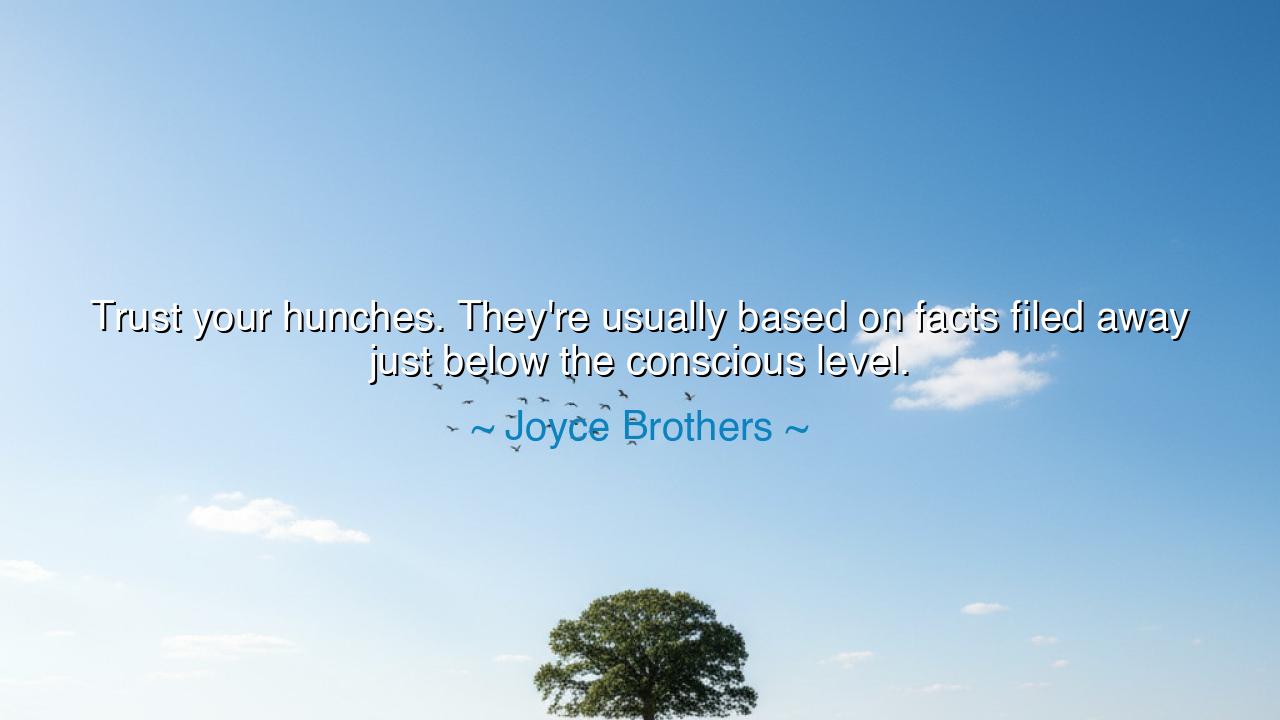
Trust your hunches. They're usually based on facts filed away
Trust your hunches. They're usually based on facts filed away just below the conscious level.






The words of Joyce Brothers—“Trust your hunches. They're usually based on facts filed away just below the conscious level.”—speak to a power within the human soul that is both mysterious and profound. She reminds us that what we call a hunch is not a careless guess, but the whisper of wisdom gathered silently over time. Our minds are like vast libraries, filled with countless observations, experiences, and truths we did not pause to study. And when the moment of decision comes, the soul brings forth these hidden treasures in the form of an inner voice, a sudden knowing, a gentle push toward the right path.
To trust your hunches is to honor the wisdom of your own being, to recognize that knowledge does not always speak in long arguments or clear logic, but often in quiet impulses born of buried truth. The ancients spoke of this as intuition, as the voice of the gods, as the stirring of the spirit. Yet modern understanding tells us what sages already suspected—that the mind records more than we realize, and when patterns emerge, it calls out to us in subtle ways. Thus, what feels like mystery is often memory disguised.
History provides luminous examples of this hidden force. Consider Joan of Arc, a simple maiden with no training in war. Guided by her visions and hunches, she led armies and inspired a nation. To many, her confidence seemed madness, but in truth, her intuition drew upon deep faith, keen observation, and the unspoken knowledge of a people longing for deliverance. Or think of Thomas Edison, who trusted flashes of insight that others would have dismissed. His inventions were not born of chance, but of a mind trained to heed the signals that others ignored.
The danger lies not in having hunches, but in dismissing them. How often have men ignored the quiet warning of their heart, only to fall into ruin? How often has a traveler felt the sense of danger in the air, but pressed on and met disaster? The instinct that whispers is a guardian; it draws upon truths too deep for words, urging us to pause, to act, or to change course. To silence it is to throw away a shield placed in your hand.
Yet we must also remember that trusting hunches does not mean abandoning reason. Intuition is not opposed to logic; it is its hidden ally. It is reason’s younger brother, quick where logic is slow, drawing upon unseen threads. The wise man tests his hunches but does not scorn them. He marries them with thought, and in that marriage finds guidance both swift and sure.
The lesson for us, then, is clear: listen to the stirrings within. When you feel a sudden insight, ask where it comes from, but do not reject it simply because it is silent and unseen. Train your hunches by filling your mind with truth, with study, with experience, for intuition draws only from what you have stored. A heart filled with wisdom will give rise to wise hunches; a mind filled with folly will whisper folly.
Practically, this means reflecting on past experiences where your intuition proved true, and learning to recognize its voice. It means slowing down enough to hear it, in a world that clamors with noise. It means respecting your inner guide, while also seeking knowledge to refine it. Walk with both reason and intuition, and you will tread the path of balance and wisdom.
So let Joyce Brothers’ words echo in your spirit: “Trust your hunches.” For they are not mere shadows, but sparks of truth drawn from the hidden depths of your being. They are the voice of your experience, the fruit of your observation, the murmur of truths your conscious mind has not yet grasped. Listen to them, honor them, and they will serve as silent companions, guiding you toward peace, safety, and greatness.






AAdministratorAdministrator
Welcome, honored guests. Please leave a comment, we will respond soon